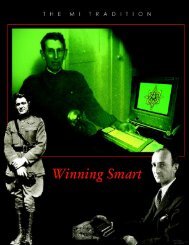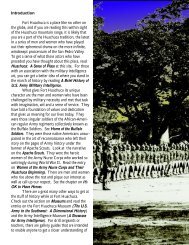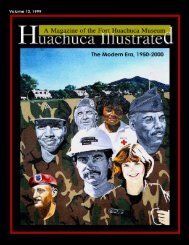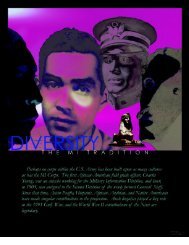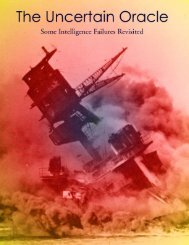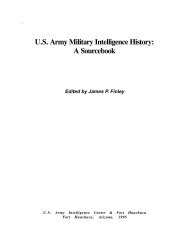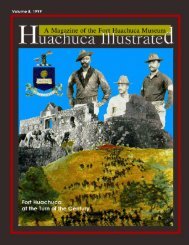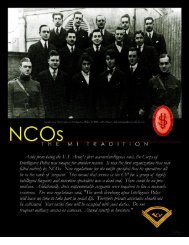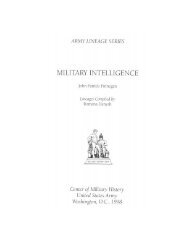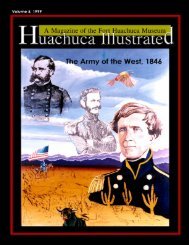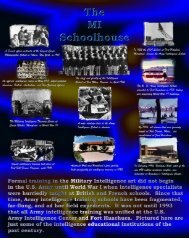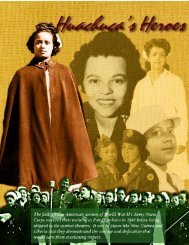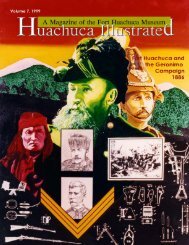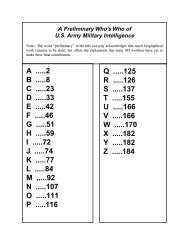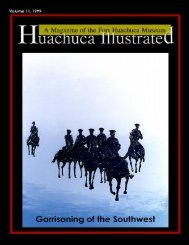Apache Campaigns - Fort Huachuca - U.S. Army
Apache Campaigns - Fort Huachuca - U.S. Army
Apache Campaigns - Fort Huachuca - U.S. Army
Create successful ePaper yourself
Turn your PDF publications into a flip-book with our unique Google optimized e-Paper software.
ground between officers’ quarters and barracks on the far side.<br />
This was only to draw attention to that line. A mounted party of fifty-odd Indians<br />
jumped into sight below the sawmill, five hundred yards from McGowan’s position. They<br />
charged the post trader’s buildings, whooping and shooting and waving their guns as they<br />
came.<br />
Old McGowan was a veteran of the famous California Column and he had been<br />
stationed in Arizona and New Mexico throughout the Civil War. He was an old hand at this<br />
business and now he held his men quiet, watching for the precise point at which the charge<br />
would be too far advanced for easy retreat. Then he gave his orders and three nicely spaced<br />
volleys crashed into the hostiles. That band fairly evaporated, those unhit whirling their<br />
mounts to get back to cover. McGowan was troubled no more that day.<br />
The <strong>Apache</strong>s tried a blow at my line, soon after their repulse by McGowan. We noted<br />
twenty or more Indians worming their way uphill toward the hospital, which stood on a point<br />
somewhat isolated from the other buildings of the post. When they had got into easy range my<br />
detachment opened up sharply, and with the rattle of our fire and the hum of our bullets<br />
around them they lost all interest in the hospital and scurried for cover.<br />
Beyond the reservoir another sheltered party of the hostiles loosed a heavy volley that<br />
whined high over Stanton’s line and struck eight hundred yards away near the Adjutant’s<br />
office. Lieutenant Gordon fell with a severe wound in his leg. He remarked grimly that he<br />
had got his bullet and billet on the same day; his wound and his advancement to command of<br />
Troop D.<br />
The firing continued, now light, now heavy, during all the afternoon. We let them<br />
shoot away their ammunition without often trying a shot, because of the extreme range and the<br />
excellent cover they had. About sundown they sent a crashing volley into the post from across<br />
White River, in the rear of our officers’ quarters. In spite of the hail of bullets dropping we lost<br />
no men from that fire, but two or three were slightly wounded.<br />
With darkness all shooting stopped. We kept an alert watch during the night, merely as<br />
routine. For a few of us expected the <strong>Apache</strong>s to break their custom and try an attack, even on<br />
the isolated post trader’s buildings or hospital.<br />
Next day there was not an <strong>Apache</strong> in sight.... 64<br />
Reenforcements were rushed to the Arizona theater. Troops from <strong>Fort</strong> Wingate in New<br />
Mexico were sent to <strong>Apache</strong> and six troops of the Fourth Cavalry under Colonel Ranald Mackenzie<br />
were transferred from Colorado. Troops were also moved from California. General Sherman in<br />
Washington fumed, “I want this annual <strong>Apache</strong> stampede to end right now, and to effect that<br />
result will send every available man in the whole <strong>Army</strong> if necessary.” 65 John Clum said that<br />
“twenty-two companies of troops—eleven from New Mexico, and eleven from California (which<br />
included three batteries of artillery) were rushed into Arizona.” 66<br />
The troop buildup convinced most of the fugitive <strong>Apache</strong>s to return to the reservation.<br />
The five <strong>Apache</strong> Scouts in Carr’s command who had mutinied were court-martialed. Sergeant<br />
Dandy Jim, who shot Capt. Hentig, Sergeant Dead Shot and Private Skippy were sentenced to<br />
death. They were hung on 3 March 1882. Two others were jailed at Alcatraz. Carr and his<br />
superior Willcox officially argued over who was at fault for what the press had mistakenly called<br />
a massacre. Carr had to face a court of inquiry that found him, in the summer of 1882, guilty<br />
“only” of errors of judgment. Apparently the squabble did not damage Carr’s career for he was<br />
promoted to Brigadier General and subsequently placed on the retired list in February 1893.<br />
84<br />
HUACHUCA ILLUSTRATED



